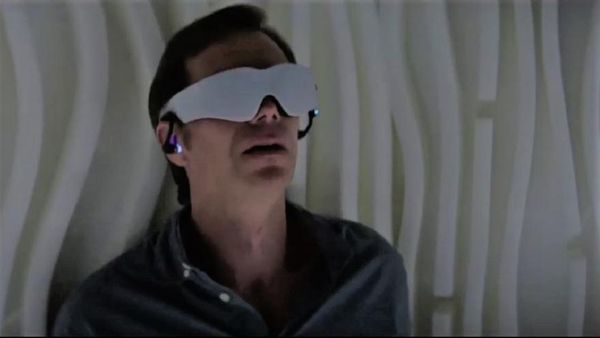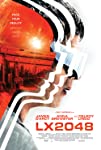Eye For Film >> Movies >> LX 2048 (2020) Film Review
LX 2048
Reviewed by: Jennie Kermode

At a time when most ruined future Earths are drawing on themes of climate change or that old stalwart, nuclear Armageddon, Guy Moshe takes a step sideways into a world where the loss of the ozone layers has rendered the daytime sun inimical to human life (the vast toll it must have taken on other forms of life is not addressed). Society has restructured itself in a way that will seem familiar to viewers watching during the Covid-19 pandemic, with most people working from home and most activities carried out in the virtual realm. Here's, life is much safer - but the shortage of accidents means that when Adam (James D'Arcy) is told that his heart is failing, he despairs - there's little hope of a transplant.
Adam has recently separated from wife Reena (Anna Brewster) but still worries about what will become of her and his three sons, especially as he remains responsible for making most of the payments on the family home. Although changing patterns of technology use means his job may not last much longer, he does still have an insurance policy which means that if he dies, his wife will receive a clone of him, altered to her specifications, to provide comfort and income. What he'd like is to use that arrangement to get just the heart cloned early, so it can be transplanted into him and he won't have to die - but Reena won't sign the necessary paperwork.

Few things in human experience elicit anything like the level of petty vindictiveness that can be occasioned by divorce. LX 2048 is at its best when exploring the ways in which two people who have obviously loved each other - and perhaps, on some level, still do - can seek so wilfully to destroy each other, even when they know that they too will be hurt in the process. Built upon and around this are multiple layers of stock science fiction plot, most of which struggle to convince at the same level.
The title refers to a drug which everybody except Adam is taking, apparently aimed at helping them to cope with the stress of their living conditions. One of the side effects of lithium is suppression of the libido, and this seems to have been a factor in the disintegration of Adam's marriage, he resorting to pursuing satisfaction with a virtual girlfriend - really not much more advanced than those available to day - and a sex doll - considerably less so. There's a stigma attached to both which hardly seems in keeping with the times. In the daytime he suits up and goes out, working alone from a Proper Office, though he doesn't seem to get much done there. Despite the sense of moral superiority that these things give him, he doesn't seem to do much with his freedom, spending most of his time whining or trying to dismiss the contradictions between his desires and his image of himself.
For a man like this, uncovering a conspiracy - even if the might be a victim of it - is a positive boon. Adam's fascination with a revolutionary new chip takes him in directions he didn't expect, but his need for a chance to prove himself will leave viewers wondering how much of this is real. There are possibilities here, even if it's well trodden ground. Segues into Shakespeare, however, become acutely embarrassing - Moshe has bitten off much more than he or D'Arcy can chew, and to evoke the Bard as if to signify intellectual depth only makes its absence more glaring.
For the most part, D'Arcy works in the role, only occasionally stretched too far. It's a demanding part and Moshe seems to have started with a very clear idea of what he wanted, failing to adapt it to suit the actor's strengths and weaknesses. A bigger problem is the staginess of the whole thing. We are of course limited, for the most part, to small interiors (one outdoor scene in glaring sunlight is impressively shot in a style that recalls the science fiction heyday of the Seventies), but the camerawork here is lacking in necessary invention. Together with Adam's whining, it makes the film hard to stick with whenever the plot slows down.
Overall, there's just enough here to appeal to science fiction fans at a time when - blockbusters mostly being off the menu - they are particularly poorly served. Nevertheless, it lacks both the imagination and the energy to appeal to the general viewer, being too restrained in its creative ambition and too generous in its opinion of itself.
Reviewed on: 24 Sep 2020
















